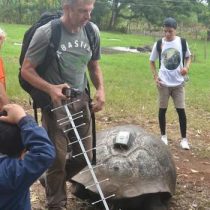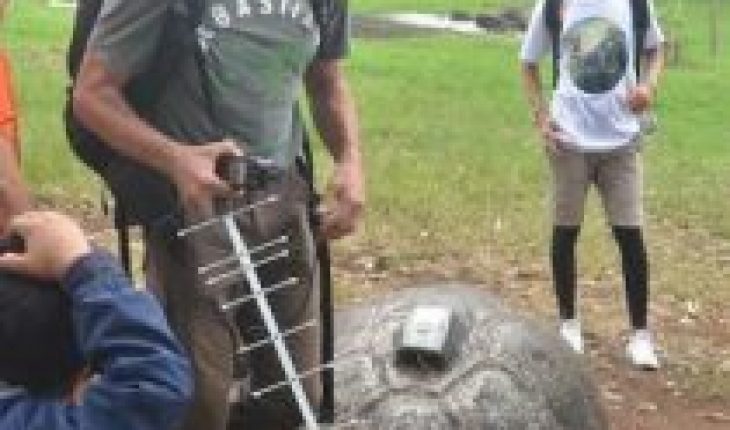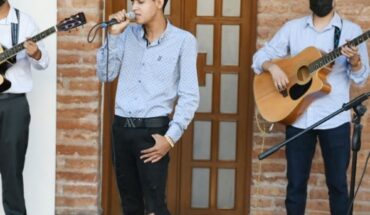
Training of young people active in conservation, through an educational experience outside the classroom where they improve their knowledge and competences and increase their favorable provisions with the environment in an effort to live in harmony with nature, which is one of the fundamental principles of Ecuador’s National Plan of Good Living. This is the horizon of the headquarters in that country of Ecology Project International (EPI), headed by the environmental communicator, Ana María Loose.
She with Justin Scoggin, principal of the Tomás de Berlanga school in the Galapagos; and the teaching biologist, Martín Narvaez, will participate in the opening day of the Second International Conference on Climate Change Education in Latin America, a meeting that is completely open and free, upon registration; aimed at teachers and professors, researchers, decision makers in public policy and interested public policy from Chile, Latin America and the Caribbean.
Climate change as a comprehensiveness
In your experience and considering the obvious deployment of the consequences of climate change, what are some keys to sharing regarding the educational methodologies you apply?
In a place as magical as the Galapagos Islands, we share the challenge with all communities on the planet of how to educate to confront, adapt and mitigate the effects of climate change.
Among the most important keys is to work under a focus of seeing climate change as a comprehensiveness of what our actions are, our habits. I think everything is connected to the principles of sustainability, because we cannot simply separate everything as a series of content that talks about the impacts, but we have to address it with the complexity that this requires. So our action in education, beyond addressing specific issues of climate change – which we also address them – is to address the environmental behavior or sustainable behavior of the people who live here on the islands.
We are working with students from all the schools of the Galapagos Islands, and we offer some courses and camps type experiential, where five-day students leave their comfort zone, their homes, work in their classrooms, and come with us to share life outdoors, where they are taught how to live with nature through an experiential methodology , using the inquiry and scientific process so that kids can observe and ask questions. With them these answers are built, where they really delve into their actions about their environments, what they are doing, what they need to motivate or mobilize the rest.
What impact does the inquiry approach have?
I think it’s been fundamental. You can’t generate learning without the first step that’s just arousing that curiosity. How does human being learn? Human beings learn through observation and experience.
If you look at something that’s causing you some noise in your daily life, something that’s not fitting up well with the way you do things, you start making those conclusions from the observation of something real about what’s going on around you, something everyday. From that observation that generates a curiosity, a need, you begin to ask yourself questions: how can I change this situation, what would I do to improve this here?
Ana María Loose environmental communicator.
Education an innate and natural process
What are the particularities of this educational approach in the Galapagos and Ecuador?
One of them is the need to work in networks, because being a small community – we have about 30 thousand inhabitants settled on 4 islands – we have created a network of formal and non-formal educators of environmental education. Through this space we try to share the practices and update in this group of teachers the best pedagogical practices, share lessons that are learned so that we can replicate.
The idea is to be able to reach the greatest number of students and population, but if we do it from an institution our reach will always be limited; therefore, working in an organized way through a network, a support group, which is working for the same objectives, is giving very good results. Maybe it’s not something specific, but we take this advantage.
The other is that in places like the Galapagos, the impacts that are already having the change are more evident climate, then one can use the environment as the outdoor class; that students can see the theory in the classroom, and we complement this experiential learning through what is happening, for example, with the theme of water scarcity, prolonged droughts or stronger rains, which are evident because they are things that you can see here more easily than in the city.
What do you expect from participation in this educational experience exchange meeting?
We want to learn from experiences elsewhere, see if we share the same challenges, enrich our practices, and also humbly put the experiences we can share from the Galapagos Islands.
For this webinar I invited some colleagues. One is Justin Scoggin, he is principal of a model school that just works with these principles of sustainability. We will also be joined by an educator biologist working within this initiative, Martín Navaez, who will tell us a little more about the impact of climate change on island ecosystems. I think among the three of us we’re going to make a great combination to share this experience with the audience.
What is the invitation to teachers and the community at large who can join this virtual meeting?
I’m calling you all. I firmly believe that education is an innate and natural process, which occurs from little ones that we are learning things. Parents are our first educators.
This is a workshop that is aimed not only at formal and non-formal educators and teachers, but the entire international community, to rethink the way we are interacting with the planet, with our children and family, because there can always be an opportunity, even a learning process, even if we are not in a teaching space, even if we are not in a formal educational space.
The fact that we reflect on our habits when we are teaching our children, and how to use the resources we have at home; just saying “turn off the light,” or “save water.” There we are doing education for climate change, so I think there are some guidelines and thoughts that all exhibitors are going to share and that will serve not only those who do education, but the whole community that can participate in this workshop and I think is going to be fundamental.
The Second International Climate Change Education Conference will be held remotely from 23 to 25 June and will convene representatives of governments, society and international experts under the slogan “Strengthening Networks for Action”. All information, program and registrations in www.cr2.cl/ciecc2020/





